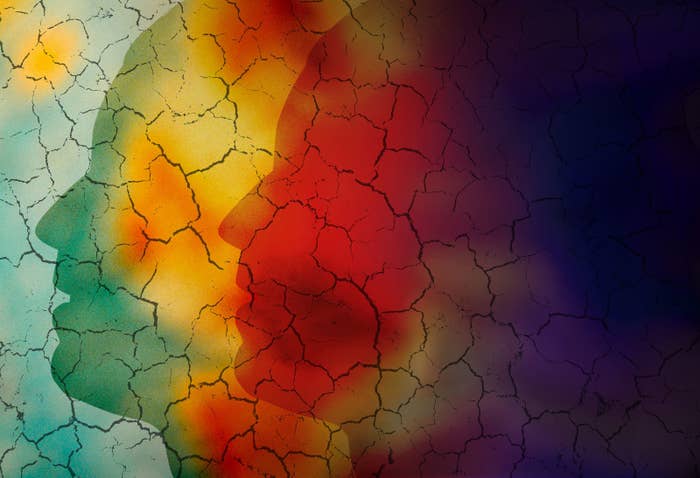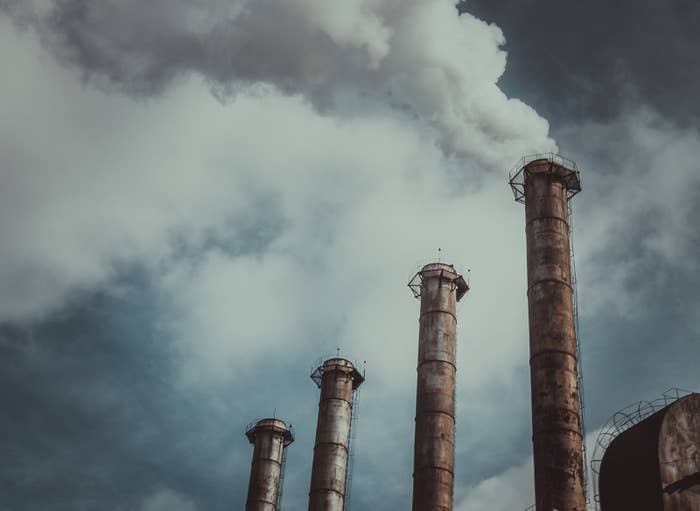
A new branch of psychology known as ecopsychology is emerging to help those who are dealing with feelings of grief, despair and hopelessness as a result of global warming.
Tiyan Baker is a 29-year-old artist and documentarian who researches climate change extensively for her practice, and is well versed in the global ecopsychology community.
Baker told BuzzFeed News that she first became heavily involved in researching climate change after living in China, and has experienced a deterioration of her mental wellbeing as a result of self-education around global warming.
"I really feel like I can visualise it almost," she said. "I've seen environmental degradation. You don't have to go far [in China] to see waterways that are clearly ruined, the air is unbreathable many days of the year."
Baker says she feels particularly sad about how climate change will affect the developing world.
"We're going to see mass death and mass migration – and there's a climate justice issue here because [developing nations] haven't caused a lot of the situation that we're in."
Baker's struggle with mental health in the face of climate change led her to join online communities of people who experience the same anxieties and grief.
She says one Facebook group she is involved in is made up of "very grim baby boomers".
"They believe in human extinction, they believe that it's inevitable and it's in the near-term, and they're kind of people that are wrapping up their lives emotionally," she said. "People go on there and they're like 'I'm getting a vasectomy next week', there's a lot of grief."
The term ecopsychology is attributed to a book written by Californian academic Theodore Roszak published in the 1990s, which proposed a new discipline of psychotherapy that sought to understand the "ecological unconscious" in each person. Roszak believed there was an inextricable link between the environment and human psychology.
Increasingly, this fusion of environmentalism and psychotherapy is being dedicated to the painful experience of coming to grips with the impending reality of climate change.
The Intergovernmental Panel on Climate Change (IPCC) report released in early October outlined the difference in global environmental changes that will occur if the Earth's surface temperature rises 2C above pre-industrial levels, compared with those that will occur if that rise is capped at the aspirational limit of 1.5C outlined in the 2015 Paris Climate Agreement.
In 2017 the world's temperature rose 1C above pre-industrial temperatures. The IPCC report states that in order to keep global temperatures below the Paris Climate Agreement cap, the world must achieve net zero carbon emissions by 2050.
The 2018 Report of the Global Commission on the Economy and Climate released earlier this year painted a bleaker portrait than the IPCC, stating that without a "decisive shift" by 2030 the globe will pass the point of no return and be unable to keep the global temperature rise to below 2C.

While three-quarters of Australians are concerned about global warming, the emotional toll can be greatest for those who work in environmental research and activism.
Dr Sally Gillespie is an academic from Western Sydney University and a retired therapist. She became involved in climate change research in 2010 and came to realise there was a need to address its psychological consequences.
Gillespie published a research paper in 2014 that outlined the emotional needs and responses of people who were highly-educated about climate change issues. Gillespie told BuzzFeed News that people tend to experience a deep uncertainty or fear of the future when they delve into climate change research and stay engaged with the topic for extended periods of time.
"People who are very engaged, either through their work or campaigning, do experience feelings of isolation … you commonly see anxiety, grief, guilt, despair, anger; there's a whole range of things that come up – there's a numbness, too.
When you start talking to people who are very engaged … they feel quite isolated in our culture because we've had a pretty strong dampening in public discourse around climate change in a lot of the mainstream media."
Gillespie said often if people try and talk about climate change in social situations, the response is generally "for others to back off, make a joke, change the topic…"
"People think you're a downer," said Baker.
Chris*, a 24-year-old hospital accounts manager from Sydney, told BuzzFeed News the fear of climate change is taking its toll on his mental health and wellbeing.
"Climate change has been worrying me a lot," he said. "I've been researching the practical effects of climate change and it's getting harder to sleep at night thinking about them."
Chris’ fear of climate change has made him question whether he wants to one day have children.
"I'm worried about the world I'd be bringing them into," he said. "I know their quality of life will be worse than mine, with extreme weather events and food shortages. It just seems wrong to knowingly subject someone to that."
According to a US climate organisation, it is increasingly common for adults in their 20s and 30s to factor climate change into their considerations about having children.
Gillespie has met many people in her research who are grappling with this question.
"There [are] a lot of tensions there and there are two strains to that: one is a sense of responsibility, especially living in Australia where we have the highest carbon footprint per capita … and the other side of it of course is what sort of a world you'd be bringing a child into."
Psychologists are beginning to openly discuss the emotional consequences of climate change, creating communities that allow people to talk about their feelings of grief or despair.
The Australian Psychological Association, the peak body for Australian psychology, has established an interest group for environmental psychology.
Carol Ride is a licensed therapist and the convenor of Psychology for a Safe Climate, a Melbourne-based organisation originally established to engage people with the issues of climate change by using emotive rhetoric.
Ride told BuzzFeed News that in the past three years the purpose of the organisation had shifted to helping those who are feeling depressed and anxious as a result of climate change by providing group therapy sessions.
"There are a lot of people who are feeling depression, those who really understand the science … and how significant the necessary action is," said Ride.
Ride says the fundamental difficulty in helping people who are suffering the consequences of engagement with climate change is that "it's a completely rational response to be alarmed and concerned and emotionally impacted".
Psychology for a Safe Climate finds that people who are concerned about climate change often have problems with mainstream psychologists who are not equipped to discuss that specific topic. It now refers clients in Melbourne to names from a database of trusted therapists it has amassed.
"They need to be therapists who understand how acute the problem is … we don't want people to be pathologised for their concern about climate change," said Ride.
For those who may not need therapy, Ride says that "active hope" – a practice coined by ecophilosopher Joanna Macy that aims to build resilience through community activism – is a positive method for dealing with the psychological impact of climate change.
"It's people who are in community groups, who are doing work, often political activity, helping their communities understand that there are solutions," said Ride.
Research has found that the different personal motivations for concern about climate change drive emotional responses to the problem.
According to a study conducted by researchers from the University of Texas and the University of Arizona last year, people tend to cluster around three forms of environmental concern: egoistic (concern for one's health or life), social-altruistic (concern for humanity at large), and biospheric (ecological concern for plants and animals).
Lead author of the study, associate professor Sabrina Helm from the University of Arizona, told BuzzFeed News that "the strongest link to depression [was] amongst those who were biospherically concerned. People who reflect a lot on the environment and place a lot of value on the environment, they are the ones who worry the most about it," she said.
Helm believes the discourse around individual action in the media needs to change: "A lot of consumers don't perceive themselves as being in a position where they have a lot of impact … [but] everybody's little action matters, absolutely every action counts – not because the action in itself leads to an impact, but it's the motivation behind it. If I can do a little thing then I can also do a big thing."
Baker believes in the idea of community engagement as a way to improve her mental health about global warming, but is not sure how she will enact it.
"It is actually such an overwhelming issue, such a dire set of circumstances that I think it's unclear what action can be taken," she said. "But I think there is a constructive conversation to be had."
* Surname withheld for privacy.
